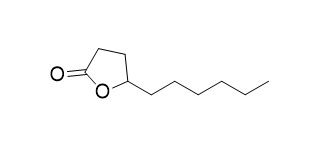gamma-Decalactone
gamma-Decalactone is a valuable aroma compound.could be food industry.
Inquire / Order:
manager@chemfaces.com
Technical Inquiries:
service@chemfaces.com
Tel:
+86-27-84237783
Fax:
+86-27-84254680
Address:
1 Building, No. 83, CheCheng Rd., Wuhan Economic and Technological Development Zone, Wuhan, Hubei 430056, PRC
Providing storage is as stated on the product vial and the vial is kept tightly sealed, the product can be stored for up to
24 months(2-8C).
Wherever possible, you should prepare and use solutions on the same day. However, if you need to make up stock solutions in advance, we recommend that you store the solution as aliquots in tightly sealed vials at -20C. Generally, these will be useable for up to two weeks. Before use, and prior to opening the vial we recommend that you allow your product to equilibrate to room temperature for at least 1 hour.
Need more advice on solubility, usage and handling? Please email to: service@chemfaces.com
The packaging of the product may have turned upside down during transportation, resulting in the natural compounds adhering to the neck or cap of the vial. take the vial out of its packaging and gently shake to let the compounds fall to the bottom of the vial. for liquid products, centrifuge at 200-500 RPM to gather the liquid at the bottom of the vial. try to avoid loss or contamination during handling.
J Nat Prod.2018, 81(4):966-975
Biochem Biophys Res Commun.2018, 505(1):261-266
Front Nutr.2024, 11:1507886
Appl. Sci.2021, 11(24),12080
J Anal Methods Chem.2024, 2024:7703951.
Journal of Functional Foods2022, 91:105019.
Int Immunopharmacol.2024, 143(Pt 2):113486.
Plants (Basel).2020, 9(11):1422.
Nutr Res Pract.2020, 14(3):203-217.
Biochem Pharmacol. 2023, 210:115463.
Related and Featured Products
Applied microbiology and biotechnology, 1998, 49(3):295.
Peroxisomal beta-oxidation activities and gamma-decalactone production by the yeast Yarrowia lipolytica.[Reference:
WebLink]
gamma-Decalactone is a peachy aroma compound resulting from the peroxisomal beta-oxidation of ricinoleic acid by yeasts.
METHODS AND RESULTS:
The expression levels of acyl-CoA oxidase (gene deletion) and 3-ketoacyl-CoA thiolase activities (gene amplification on replicative plasmids) were modified in the yeast Yarrowia lipolytica. The effects of these modifications on beta-oxidation were measured. Overexpression of thiolase activity did not have any effect on the overall beta-oxidation activity. The disruption of one of the acyl-CoA oxidase genes resulted in an enhanced activity. The enhancement led to an increase of overall beta-oxidation activity but reduced the gamma-Decalactone production rates. This seemed to indicate a non-rate-limiting role for beta-oxidation in the biotransformation of ricinoleic acid to gamma-Decalactone by the yeast Yarrowia lipolytica. All strains produced and then consumed gamma-Decalactone. We checked the ability of the different strains to consume gamma-Decalactone in a medium containing the lactone as sole carbon source. The consumption of the strain overexpressing acyl-CoA oxidase activity was higher than that of the wild-type strain.
CONCLUSIONS:
We concluded that peroxisomal beta-oxidation is certainly involved in gamma-Decalactone catabolism by the yeast Y. lipolytica. The observed production rates probably depend on an equilibrium between production and consumption of the lactone.
Applied and Environmental Microbiology, 2001, 67(12):5700-5704.
Role of beta-oxidation enzymes in gamma-decalactone production by the yeast Yarrowia lipolytica.[Reference:
WebLink]
Some microorganisms can transform methyl ricinoleate into gamma-Decalactone, a valuable aroma compound, but yields of the bioconversion are low due to (i) incomplete conversion of ricinoleate (C(18)) to the C(10) precursor of gamma-Decalactone, (ii) accumulation of other lactones (3-hydroxy-gamma-Decalactone and 2- and 3-decen-4-olide), and (iii) gamma-Decalactone reconsumption.
METHODS AND RESULTS:
We evaluated acyl coenzyme A (acyl-CoA) oxidase activity (encoded by the POX1 through POX5 genes) in Yarrowia lipolytica in lactone accumulation and gamma-Decalactone reconsumption in POX mutants.
CONCLUSIONS:
Mutants with no acyl-CoA oxidase activity could not reconsume gamma-Decalactone, and mutants with a disruption of pox3, which encodes the short-chain acyl-CoA oxidase, reconsumed it more slowly. 3-Hydroxy-gamma-Decalactone accumulation during transformation of methyl ricinoleate suggests that, in wild-type strains, beta-oxidation is controlled by 3-hydroxyacyl-CoA dehydrogenase. In mutants with low acyl-CoA oxidase activity, however, the acyl-CoA oxidase controls the beta-oxidation flux. We also identified mutant strains that produced 26 times more gamma-Decalactone than the wild-type parents.



